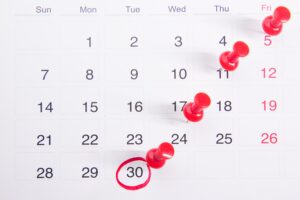We want to remind you that the information provided does not constitute legal advice.
Even the worst disasters and challenges give us a few lessons that serve us in our personal lives, relationships, families, profession, jobs, and businesses. Hurricane Ian was no exception. During our firm’s Monday morning leadership team meeting, each team leader identified lessons they learned from the Hurricane Ian experience. These lessons were personal and had implications for our firm, as well as every business we serve.
Gratitude
Unfortunately after every natural disaster, some people don’t fare as well as others. In these moments, we have a lot to be grateful for. Gratitude, it is said, is the mother of all virtues and the parent of all others. All other virtues that we aspire towards–happiness, hope, justice, respect, beauty, and safety–are made paler, hallowed, and less inspired without gratitude. Gratitude is the affirmation that indiscriminate goodness exists everywhere, and is a state of being, a state of thankfulness. It helps us remember to not take anything for granted and be inspired. 
Perspective
When handling the issues their businesses face, owners often consider many different perspectives. Similarly, when confronting an impending natural disaster, business leaders should try to consider not only their perspectives, but also the perspectives of their people, their customers, their vendors, and other stakeholders, as the perspective of all of these groups impact a business. Some impacts are predictable, while others are not. If we just focus on the entrepreneurs’ or executives perspectives, we may develop “tunnel vision” and create solutions for the “wrong problems” leaving the business more vulnerable than necessary.
No Two Storms Are the Same
Unlike hurricanes of the past, Hurricane Ian brought an overwhelming amount of rain to Central Florida, causing massive flooding and leaving many homes and businesses with tremendous water damage. While we can try to predict the future based on our experiences with prior hurricanes, we must be prepared for the unexpected.
Lack of Control
Some things are within our control and others are not. While we did not have any control over the direction, intensity, rainfall, and other aspects of Hurricane Ian, we did have control over how we chose to react, and what we did to prepare to protect our family, property, business assets, systems and processes, and other resources. Understanding what you can and cannot control is the first step for every business facing an anticipated natural disaster.
Vulnerability
During the storm, we have seen countless examples of neighbors helping neighbors, businesses helping other businesses, and strangers helping strangers. Regardless of how well we prepare, how proactive we are, and what resources we have, we are all vulnerable in one way or another. Exposing and embracing our vulnerabilities allows us to share our experiences, our thoughts, and our fears, and helps others understand how they can help us through difficult times. When our vulnerability is exposed, the best of our circle of colleagues, friends, and families come to our aid and do what they can to help us through the challenges we face.
Prioritize
We could have done numerous things at home and in our businesses to prepare for the potential impacts of Hurricane Ian. The first priority was taking care of our people, making sure that they had the time and resources to prepare at home so that their families would be safe. Once we addressed this priority, then we turned our attention to the preparations needed to ensure that the business’ assets, systems, processes, and other resources were protected, and that we had contingency plans, depending on the possible impacts of the storm. 
Planning
Benjamin Franklin said, “If you fail to plan, you plan to fail.” This popular adage has true meaning when a natural disaster is expected. Weaving a disaster plan into your business’s strategic plan is a good way to consciously think and focus on the issues incidental to possible and probable challenges. While many larger businesses implement this process into their planning sessions, many smaller businesses do not take the time to consider how to plan for a natural disaster. As a result they may not have the right insurances in place, enough cash reserves, the proper back-up systems, or alternative ways to provide their services to their customers. A good planning session can take as little as one hour. The impact can be overwhelmingly positive for a business.
Preparation
We have to get prepared before we can start talking about staying prepared. For our people, getting prepared may mean that we help them develop a checklist of the items they need at home in case of electricity loss, emergency contact lists, and a healthy stock of non-perishable foods and dry goods and toiletries. For our business getting prepared may mean that we make also make a list of all the business’ assets, systems, processes, and other resources. It may also mean that you have to make sure that you have the right equipment. It may require taking pictures before the storm, and creating a check list of what to do before, during and after the storm to ensure that our people are doing ok, that our assets are protected, that our systems and processes are redundant, and that all other resources are considered. Having concrete defined lists and checklists can help you automate the process and reduce the risk of error, enduring that you are prepared as you can be.
Don’t Take Anything for Granted
Where our focus goes, our energy flows. At times, we are so focused on the day-to-day tasks that we do not take time to reflect on the other aspects of our business and we take it for granted that our people will show up and do their jobs, which our vendors will always deliver what we need, that our customers will pay on time, etc… By consciously taking the time to meet on a regular basis with your team, and actively seeking their input and listening to them, you can widen your focus and raise your awareness, both of which are critical to business leadership, especially before, during and after a natural disaster.
Avoid Procrastination
“Don’t wait until the last minute!” This life lesson is equally important to businesses. Do everything you need to prepare for the next storm – prioritize, plan, obtain the right insurance coverage. In Florida, it’s not a matter of “if” but a matter of “when.”
To learn more about the Private Corporate Counsel™ Program, book a free consultation today by calling us at 407-647-7887 or submitting a request for a free consultation. The Private Corporate Counsel™ program consists of business attorneys, consultants, and mediators that help you optimize your business.